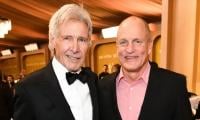Unsung heroes
Part - XXX...Random thoughts
By Dr A Q Khan
March 25, 2015
In continuation of the story of all those unsung heroes who made it possible for our nuclear programme to succeed, an important link, and a good friend, was Fred Tinner. At that time he was working in a small company which manufactured state-of-the-art nuclear valves, exported worldwide.
I already knew of the company from my work in the enrichment field, so I decided to visit the factory together with a European friend who was one of our suppliers. The factory was located close to the borders of two other European countries. At the factory we were introduced to their chief engineer – a tall, jolly person with a good sense of humour. We got on well immediately and went on to become good friends. The company was able to meet all our valve requirements. He had a wonderful, warm family – his wife, two sons, Marco and Urs, and a daughter named Sonia. His wife was an excellent cook and always invited us for a meal whenever we were there.
A friend of his, who was director finance in the company, used to fetch us from the airport. He was a heavy smoker, preferring a very pungent brand, often making the drive unpleasant for us by his incessant smoking. Both these men visited Pakistan many times and they grew to know Islamabad well. My friend also introduced us to another of his friends, an engineer and director of a company.
We soon realised that the company was in a position to deliver important systems and devices. As I didn’t want to depend on one supplier, we discussed the matter with the engineer and he told us that the company had never made a plant of that kind. Since we had already made all the drawings and process information, we offered to help. Our relevant authorities immediately agreed with my strategy and the company was able to supply the desired plant at a much earlier date than the previous supplier did.
I would like to emphasise here that during all those years of doing business with foreign companies we did not violate any export rules of the supplier countries. Everything came through normal routes after clearance from their customs officials. Only later were the European suppliers into placing embargoes, but by then we had what we needed. I had done my homework well and by the time the embargoes were in place, we were self-reliant. This point was often stressed by Ghulam Ishaq Khan and made his association with the programme a proud one.
In achieving this self reliance, Dr Hashmi, Col Qazi, Eng Naseemuddin, Eng Nurul Mustafa, Eng Aijazi, Eng Bhatti, Dr Javed Arshad Mirza, Eng Nasim Khan, Brig Qayyum, Dr Zafarullah Khan, Dr Ashraf Atta and others played key roles. They managed to put us on par with the most advanced countries of the world in this technology.
Another unsung hero who provided us with invaluable help and services is another friend of long standing, a class fellow at a western university. We did our Masters together and while I went to another country, he joined the navy of a European country. After some time he left the Navy and set up his own consultancy. He turned out to be an invaluable supplier. Being an engineer, he was an expert in materials, etc. and could meet our specific requirements. He often came to Islamabad and had many meetings and dinners with my colleagues.
We had once again placed an order and when it was about to leave the airport it was stopped by the customs authority of that country under US pressure. We were offered 50 percent compensation and since the government of that country was giving us substantial development aid, a court case would be counterproductive in the long run.
On one of our journeys back from Europe we decided to break the journey at a friendly Muslim country. We stayed at a small, cosy hotel with a beautiful view.
While out on an exploratory walk we saw an exhibition of electric and electronic equipment going on and decided to investigate. There we met a gentleman with a Stalin-like moustache who had worked for a European company as an engineer. We collected all his literature and invited him to visit Islamabad. He brought a friend of his who had an electronics company with him. They were both very sincere and willing to help.
It was easy for them to obtain electronic equipment for us which we were having trouble obtaining elsewhere. The Americans later put pressure on the country but failed.
As a lay person and an outsider it is difficult to imagine just how important the help of these foreign friends was to us. They were sincere and honest and our relationship was mutually enjoyable. We were all put into severe difficulties and troubles. All those friends were later hounded by their own governments under pressure and were prosecuted and jailed.
To be continued
Email: dr.a.quadeer.khan@gmail.com
I already knew of the company from my work in the enrichment field, so I decided to visit the factory together with a European friend who was one of our suppliers. The factory was located close to the borders of two other European countries. At the factory we were introduced to their chief engineer – a tall, jolly person with a good sense of humour. We got on well immediately and went on to become good friends. The company was able to meet all our valve requirements. He had a wonderful, warm family – his wife, two sons, Marco and Urs, and a daughter named Sonia. His wife was an excellent cook and always invited us for a meal whenever we were there.
A friend of his, who was director finance in the company, used to fetch us from the airport. He was a heavy smoker, preferring a very pungent brand, often making the drive unpleasant for us by his incessant smoking. Both these men visited Pakistan many times and they grew to know Islamabad well. My friend also introduced us to another of his friends, an engineer and director of a company.
We soon realised that the company was in a position to deliver important systems and devices. As I didn’t want to depend on one supplier, we discussed the matter with the engineer and he told us that the company had never made a plant of that kind. Since we had already made all the drawings and process information, we offered to help. Our relevant authorities immediately agreed with my strategy and the company was able to supply the desired plant at a much earlier date than the previous supplier did.
I would like to emphasise here that during all those years of doing business with foreign companies we did not violate any export rules of the supplier countries. Everything came through normal routes after clearance from their customs officials. Only later were the European suppliers into placing embargoes, but by then we had what we needed. I had done my homework well and by the time the embargoes were in place, we were self-reliant. This point was often stressed by Ghulam Ishaq Khan and made his association with the programme a proud one.
In achieving this self reliance, Dr Hashmi, Col Qazi, Eng Naseemuddin, Eng Nurul Mustafa, Eng Aijazi, Eng Bhatti, Dr Javed Arshad Mirza, Eng Nasim Khan, Brig Qayyum, Dr Zafarullah Khan, Dr Ashraf Atta and others played key roles. They managed to put us on par with the most advanced countries of the world in this technology.
Another unsung hero who provided us with invaluable help and services is another friend of long standing, a class fellow at a western university. We did our Masters together and while I went to another country, he joined the navy of a European country. After some time he left the Navy and set up his own consultancy. He turned out to be an invaluable supplier. Being an engineer, he was an expert in materials, etc. and could meet our specific requirements. He often came to Islamabad and had many meetings and dinners with my colleagues.
We had once again placed an order and when it was about to leave the airport it was stopped by the customs authority of that country under US pressure. We were offered 50 percent compensation and since the government of that country was giving us substantial development aid, a court case would be counterproductive in the long run.
On one of our journeys back from Europe we decided to break the journey at a friendly Muslim country. We stayed at a small, cosy hotel with a beautiful view.
While out on an exploratory walk we saw an exhibition of electric and electronic equipment going on and decided to investigate. There we met a gentleman with a Stalin-like moustache who had worked for a European company as an engineer. We collected all his literature and invited him to visit Islamabad. He brought a friend of his who had an electronics company with him. They were both very sincere and willing to help.
It was easy for them to obtain electronic equipment for us which we were having trouble obtaining elsewhere. The Americans later put pressure on the country but failed.
As a lay person and an outsider it is difficult to imagine just how important the help of these foreign friends was to us. They were sincere and honest and our relationship was mutually enjoyable. We were all put into severe difficulties and troubles. All those friends were later hounded by their own governments under pressure and were prosecuted and jailed.
To be continued
Email: dr.a.quadeer.khan@gmail.com
-
 Real Reason Why 'Only Murders In The Building' Cast Didn't Attend 2026 Actor Awards
Real Reason Why 'Only Murders In The Building' Cast Didn't Attend 2026 Actor Awards -
 Prince William Makes Big Decision After Princess Eugenie, Beatrice Ban
Prince William Makes Big Decision After Princess Eugenie, Beatrice Ban -
 GLP-1 Drugs Linked To Osteoporosis And Gout: New Study Reveals Higher Risks
GLP-1 Drugs Linked To Osteoporosis And Gout: New Study Reveals Higher Risks -
 Seth Rogen Unveils Catherine O’Hara's Distinguished Quality In Emotional Tribute
Seth Rogen Unveils Catherine O’Hara's Distinguished Quality In Emotional Tribute -
 MWC 2026: New Smartphones, AI Gadgets And Tech Innovations Revealed
MWC 2026: New Smartphones, AI Gadgets And Tech Innovations Revealed -
 King Offers Harry, Meghan Markle A 30 Bedroom Lodge Despite Its Decades Of Baggage: ‘it’s An Olive Branch’
King Offers Harry, Meghan Markle A 30 Bedroom Lodge Despite Its Decades Of Baggage: ‘it’s An Olive Branch’ -
 Selma Blair Talks About How Her Debilitating Disease Is 'misunderstood'
Selma Blair Talks About How Her Debilitating Disease Is 'misunderstood' -
 China’s 5-year Tech Strategy: What To Expect At Annual Parliament Meeting Amid Rivalry With West
China’s 5-year Tech Strategy: What To Expect At Annual Parliament Meeting Amid Rivalry With West -
 Andrew’s Total Meltdown On The Day Of Eviction: Insider Breaks It Down Word For Word
Andrew’s Total Meltdown On The Day Of Eviction: Insider Breaks It Down Word For Word -
 Michael J. Fox Stuns Actor Awards Audience With Rare Confession Amid Parkinson's Disease
Michael J. Fox Stuns Actor Awards Audience With Rare Confession Amid Parkinson's Disease -
 Beatrice’s In-laws Stand Against Her Marriage: ‘Furious Their Son Is Wrapped Up In Wreckage’
Beatrice’s In-laws Stand Against Her Marriage: ‘Furious Their Son Is Wrapped Up In Wreckage’ -
 Jessie Buckley Utters 'wild' Remarks For 'Hamnet' Co-star Emily Watson At Actor Awards
Jessie Buckley Utters 'wild' Remarks For 'Hamnet' Co-star Emily Watson At Actor Awards -
 Who Could Replace Ayatollah Ali Khamenei? Iran’s Top Successor Candidates Explained
Who Could Replace Ayatollah Ali Khamenei? Iran’s Top Successor Candidates Explained -
 Oliver 'Power' Grant Cause Of Death Revealed
Oliver 'Power' Grant Cause Of Death Revealed -
 Michael B. Jordan Makes Bombshell Confession At Actor Awards After BAFTA Controversy: 'Unbelievable'
Michael B. Jordan Makes Bombshell Confession At Actor Awards After BAFTA Controversy: 'Unbelievable' -
 Prince William Willing To Walk Road He ‘loathes’ For ‘horror Show’ Escape: ‘He’s Running Out Of Allies Fast’
Prince William Willing To Walk Road He ‘loathes’ For ‘horror Show’ Escape: ‘He’s Running Out Of Allies Fast’



